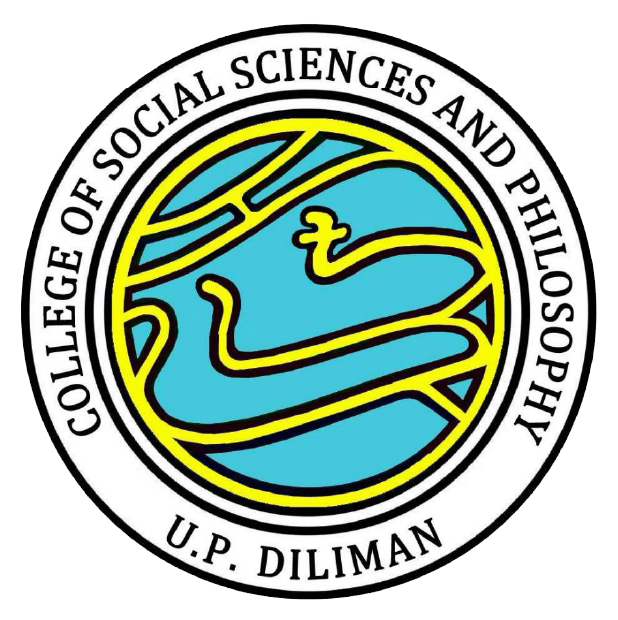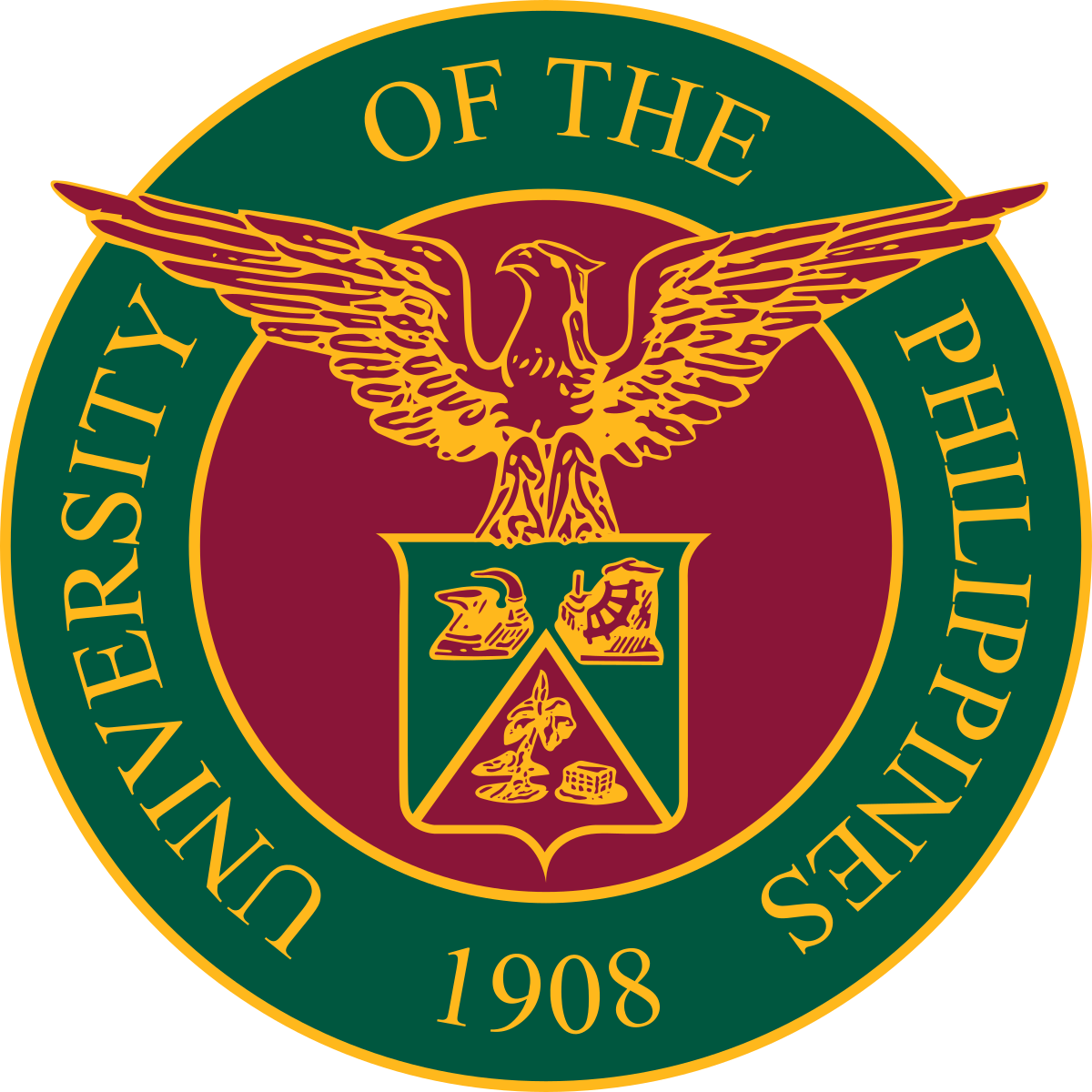Publications

"More Calories, More Protein, More Progress": The Nutribun and the Politics of Nostalgia of the Marcos Regime
The Nutribun, a ready-to-eat meal developed by a United States Agency for International Development program, became tied to Ferdinand E. Marcos when his administration claimed credit for its nationwide distribution through feeding programs. His children later used nostalgia for the Nutribun to cast the Marcos years positively, aiding their political rise. This article reframes nostalgia politics by tracing the Nutribun's changing political and emotional meanings. It shows how the bun functioned as a symbol for reimagining authoritarian rule as a time of prosperity and national pride, and how nostalgic health messages were used to deflect attention from present problems. The study links public health communication, nutrition policy, and political memory to show nostalgia's role in shaping historical narratives.
Nutrition
Ferdinand E. Marcos
Nostalgia
International Aid
Health Communication
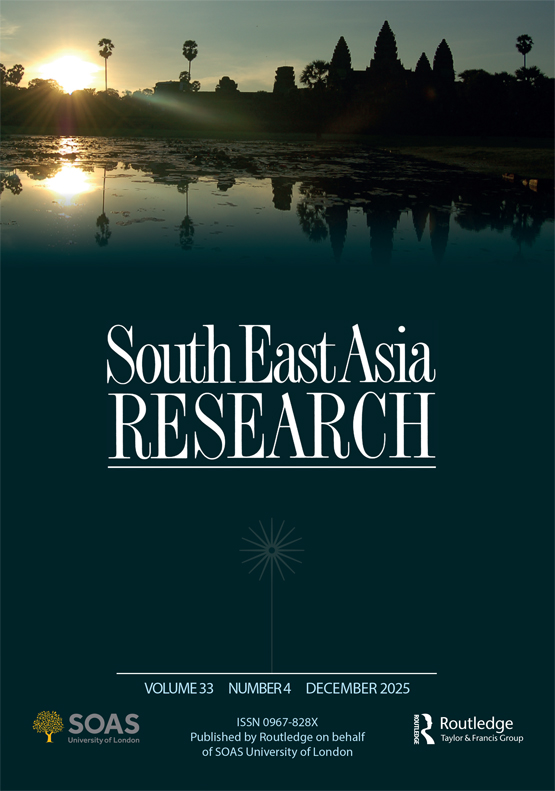
Law Between Two Empires: Marriage and Divorce in the Evolving Philippine Legal System under the Early US colonial Period, 1898–1917
The Philippines, recognized today as one of the two remaining countries that do not allow absolute divorce, once had an absolute divorce legislation, Act No. 2710, which was in force from 1917 until its repeal in 1950, a fact unknown to many Filipinos. This article, however, focuses on the reinvention of marriage and divorce from 1898 to 1917. It contextualizes this development within the transition from Spanish to US colonial rule since the military occupation on 13 August 1898, and the evolution of the Philippine legal system as a mixed legal system. The Marriage Law of 1899, Gen. Order 68, was one of the most important laws created at the time that instituted secular/civil marriage, but it had one glaring problem – the law did not provide anything on divorce. Historical literature on US imperial rule suggests a nuanced view on policymaking that accommodated existing local conditions of their colonies. In a similar light, through an examination of two case decisions, this article shows how the Supreme Court reinvented the divorce policy to incorporate new (American) and to accommodate existing (Spanish) legal characteristics, a divorce that was ecclesiastical in design but secular in jurisdiction.
Legal history
marriage
divorce
Supreme Court
mixed legal system
Philippines
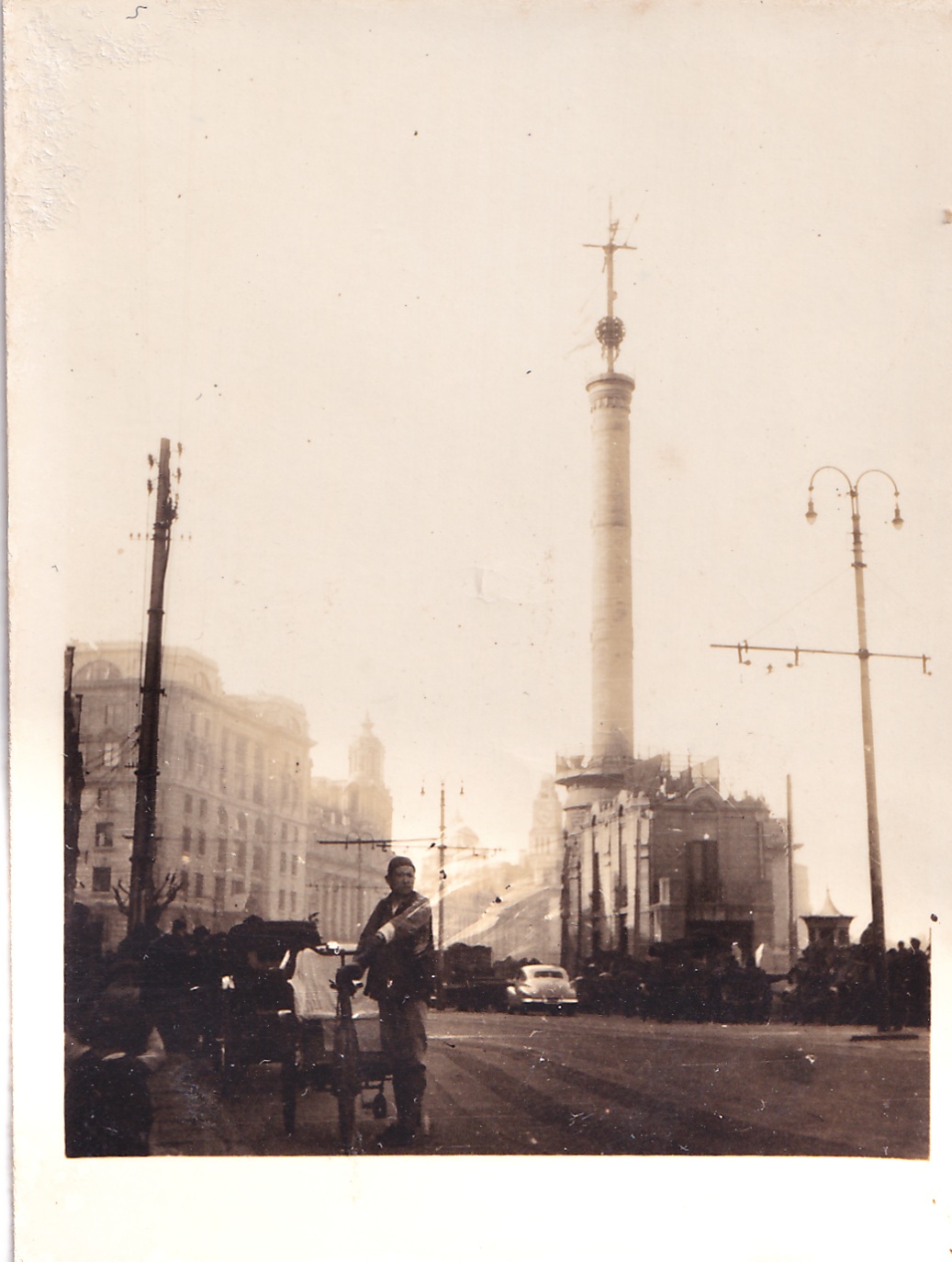
Scientific Textualizations of Tropical Cyclones in the Philippines: The Scientific Activities of the Observatorio Meteorológico de Manila (OMM) and Philippine Weather Bureau (PWB), 1860s-1940s
Since the late nineteenth century, meteorological institutions were established and have flourished in various territories in the western Pacific region. These institutions served as significant scientific enterprises that served both the local economic objectives of government and the regional and global initiatives on scientific knowledge production on weather and the environment. Meteorological observatories became centers of a calculative approach and sources of more scientific knowledge on atmospheric phenomena such as tropical cyclones and typhoons, as well as up-to-date support for mercantile shipping and trade.
This paper narrates the scientific textualizations on tropical cyclones, and typhoons in particular, through the examination of the institutional scientific activities of the Observatorio Meteorológico de Manila (OMM) and the Philippine Weather Bureau (PWB) from the 1860s to the 1940s. The scientific textualizations were manifested through local initiatives to investigate the scientific nature of Philippine tropical cyclones and typhoons and how the institutional work on meteorology expanded to various territories and contributed to the regional and global growth of knowledge networks on tropical cyclones and typhoons. The scientific work and activities of the OMM and PWB laid down the foundation of meteorological infrastructure in the Philippines in the late nineteenth and early twentieth centuries, and they became active scientific institutions in the western Pacific region.
This paper narrates the scientific textualizations on tropical cyclones, and typhoons in particular, through the examination of the institutional scientific activities of the Observatorio Meteorológico de Manila (OMM) and the Philippine Weather Bureau (PWB) from the 1860s to the 1940s. The scientific textualizations were manifested through local initiatives to investigate the scientific nature of Philippine tropical cyclones and typhoons and how the institutional work on meteorology expanded to various territories and contributed to the regional and global growth of knowledge networks on tropical cyclones and typhoons. The scientific work and activities of the OMM and PWB laid down the foundation of meteorological infrastructure in the Philippines in the late nineteenth and early twentieth centuries, and they became active scientific institutions in the western Pacific region.
typhoons
Philippine Weather Bureau
Philippines
Observatorio Meteorológico de Manila
tropical cyclones

From Religious to Political Ideologies: Historicizing Geopolitical Encounters and Their Impact on International Order in the Modern World
In this report I will delve into the intricate ways nations around the globe engage with each other and the interactions they form. We will explore the perspectives and theories put forth by esteemed scholars such as Keone, Kissinger, Mearsheimer, and Kaplan. It is essential to grasp the historical engagement between countries and the profound impact these interactions have had on the world. This scholarly exploration will encompass diverse elements including historical contexts, societal beliefs, power dynamics, geographical influences, strategic approaches, economic repurcussions, international organizations, societal and cultural perspectives, and the enduring consequences over time (Huntington 1996; Brzezinski 1997; Nisbett 20023; Slaughter 20027; at Kissinger 2015). This essay is structured into three sections: (1) Geopolitical and IR Concepts, Ideological Systems and the Invented Social Technology in the Formation of World Empires; (2) Religious Ideological Systems, Invented Social Technology and the Rise of the World Empires; at (3) Political Ideological Systems, Invented Social Technology and the Rise of Nation-States.
Historical Context
Geopolitics
Ideological Systems
International Relations
Empire Formation
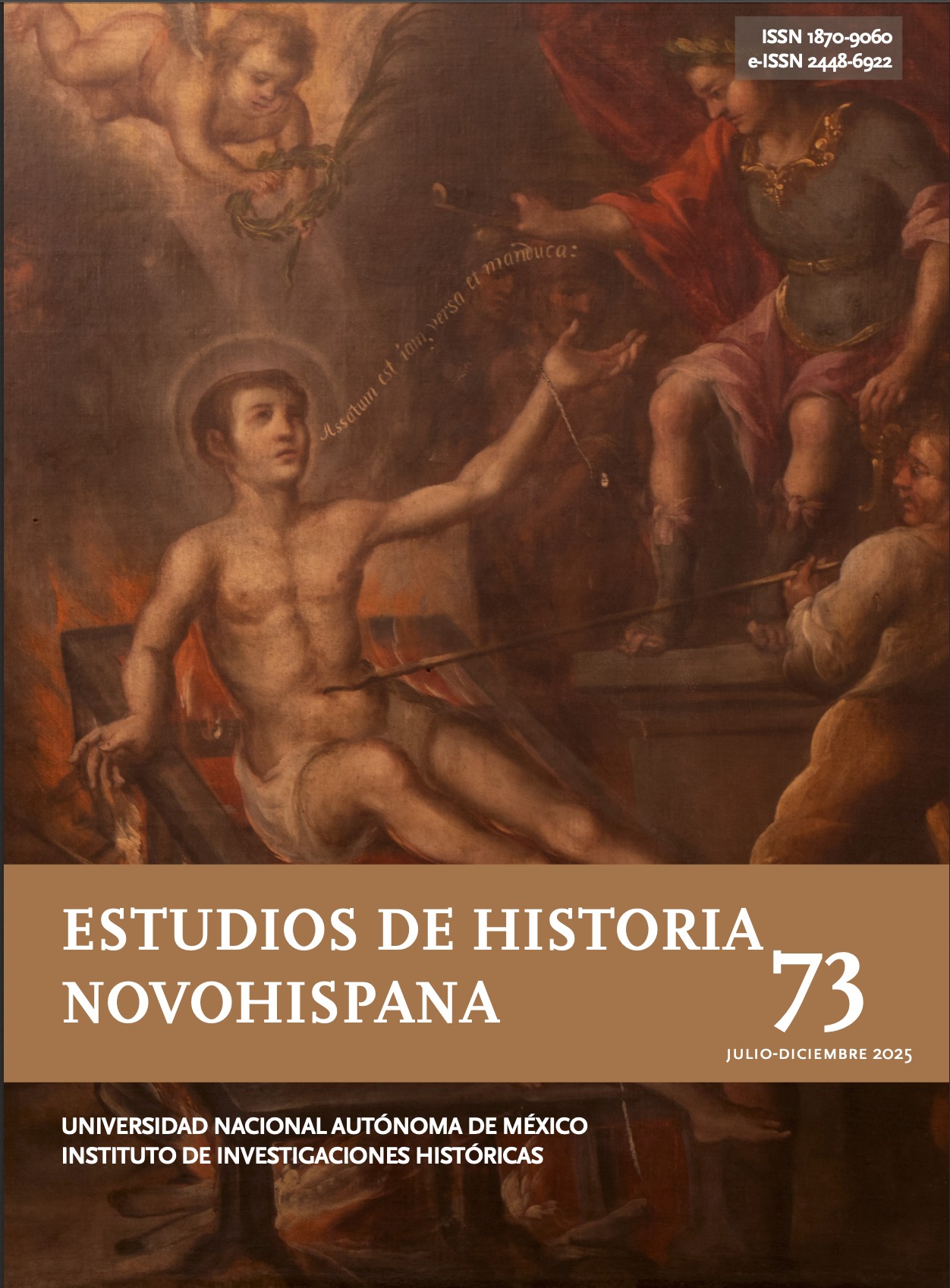
Colonial Integration: The Native Soldiers under Governor Sebastián Hurtado de Corcuera, 1635-1640 (Integración colonial: Los soldados indígenas bajo el gobierno de Sebastián Hurtado de Corcuera, 1635-1640)
By the 17th century, the Spaniards in Manila had continued expanding both southward (Ternate in 1606) and northward (Hermosa in 1626). This expansion, however, stopped due to the prevalent Moro aggression in the different provinces of the archipelago. Hence, in 1635, Felipe IV sent Sebastián Hurtado de Corcuera, as the new governor of the Philippine islands. With him were different soldiers from New Spain. In the islands, he was faced immediately with the most concerning problem —its military and the insufficiency of soldiers. This paper argues that Corcuera’s reforms treated the native soldiers with decency and honor to fully utilize them for the interest of the Spanish Crown —both in keeping order and conquest. Hence, they developed a mutualistic relationship where both benefitted from each other. This paper elaborates on the military problems which caused Corcuera to turn to the native for military recruitment. Further, it shows the relationship established between the governor and the indigenous soldiers who fought in his military campaigns in Mindanao and in the defense of Manila against Chinese insurrections. In writing this paper, I greatly utilized The Philippine Islands, 1493-1898, by Blair and Robertson while other secondary sources such as the works of Mawson were used as well
Sebastián Hurtado de Corcuera
native soldiers
Pampango
Tagalog
Chinese insurrection
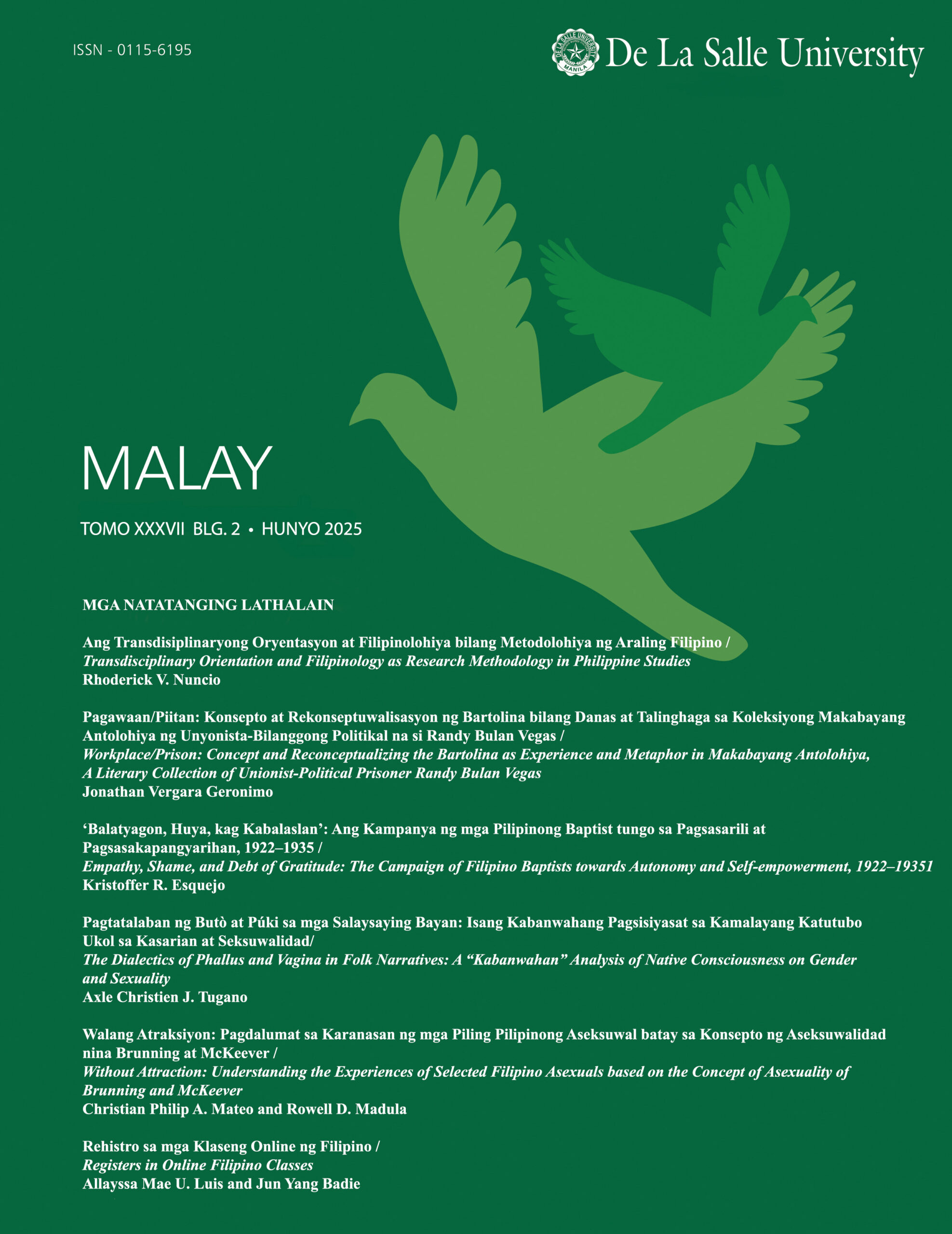
‘Balatyagon, Huya, kag Kabalaslan’: Ang Kampanya ng mga Pilipinong Baptist tungo sa Pagsasarili at Pagsasakapangyarihan, 1922–1935
Gamit ang tatlong larangan ng sikolohiya ng pakikipag-ugnayang panlipunan, itinatampok ng papel na ito ang pagkakatatag ng Convention of Philippine Baptist Churches (CPBC), isang denominasyong Protestante na nakasentro sa Kanlurang Bisaya, bilang resulta ng kompromiso ng mga Pilipinong Baptist at ng American Baptist Foreign Mission Society (ABFMS) noong 1935. Kolektibong nasadlak ang mga Pilipinong Baptist sa isang kumplikadong sitwasyon noong dekada 20 at dekada 30. Sa isang banda, naging saksi at biktima sila sa paternalismo at diskriminasyong ipinaiiral ng mga misyonerong Amerikano. Naging mulat din sila sa pagsiklab ng samotsaring kilusang agraryo at pagkilos ng mga samahang manggagawa sa iba’t ibang panig ng Pilipinas. Ibig sabihin, sumibol sa kanila ang “balatyagon” (pakiramdam) bilang pakikiisa sa rumaragasang daluyong ng damdaming nasyonalistiko ng mga Pilipino sa pangkalahatan. Sa kabilang banda, hindi nila maitatanggi ang kanilang nag-uumapaw na “kabalaslan” (utang na loob) sa mga misyonerong Amerikanong nagpamalas ng kagandahang- loob at sakripisyo upang magtamasa sila ng ginhawa sa kanilang mga buhay sa nakaraang dalawang dekada. Patunay rito ang mga iglesya, paaralan, at ospital na nagkakaloob sa kanila ng mataas na kalidad ng edukasyon at maayos na kalusugan, at nagbigay-daan sa malaking pagkakataon para umangat sa lipunang Ilonggo. Bunga ng pag-uumpugan ng dalawang nabanggit, tuluyang nanaig sa kanila ang “huya” (hiya). Batid ang katotohanang hindi nila maaaring talikuran ang alinman sa dalawang panig kaya mapayapa silang nakipagkompromiso sa mga dayuhan. Sa halip na maglunsad ng radikal na iskismong panrelihiyon, mas pinili nila ang pagtatamasa ng limitadong awtonomiya.
ABFMS
CPBC
Filipinisasyon
Iskismong Panrelihiyon
Kinagisnang Sikolohiya
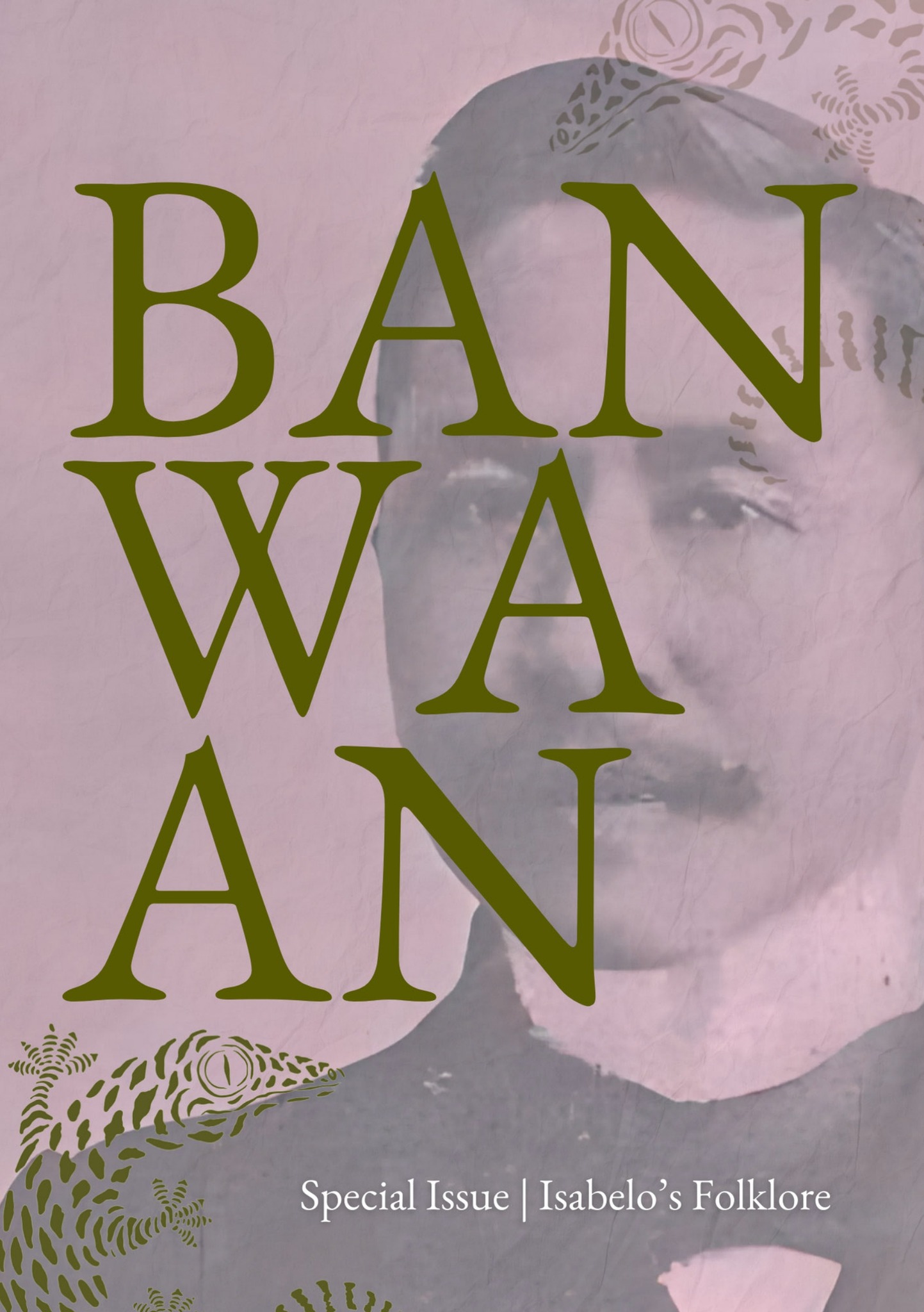
Recording Maladies and Remedies: Isabelo de los Reyes and Folk Medicine in Late Nineteenth Century Philippines
Renowned as the pioneering figure of Philippine folklore studies, Isabelo de los Reyes exhaustively documented and wrote about the Filipino people’s customs and ways of life, including popular knowledge about health and medicine. Considerably his magnum opus, Isabelo’s El Folk-Lore Filipino (1889–90) houses an abundance of folkloric notes relating to Philippine medicine, exhibiting the wide ranging varieties of folk medical knowledge from the natural to the supernatural. Despite this, numerous scholarly engagements with Isabelo’s intellectual endeavors have yet to carefully delve into the many mentions of medical knowledge present within his works on folklore. In response, this essay explores El Folk-Lore Filipino as an overlooked archive of Philippine folk medicine, covering folk medical knowledge existing by the late nineteenth century. This essay also attempts to locate El Folk-Lore Filipino within the rising professional medical community at the time, particularly the reception of Isabelo’s work on folk medicine. Against a backdrop of colonial rule, Isabelo’s keen attention to medicine in his research not only fulfilled his proposed understanding of folklore, but also contributed to his aspirations toward the development of the Filipino people’s conditions at the time.
folk medicine
El Folk-Lore Filipino
Isabelo de los Reyes
folklore
history of medicine

Isabelo’s Nature and Weather: Exploring Isabelo de los Reyes’ Notes on the Physical Environment in the El Folk-Lore Filipino (1889)
In his analysis of Isabelo de los Reyes’ Historia de Ilocos (1890), Ubaldo (2012) makes a case for the historiographical contribution of the work in local historical studies by emphasizing the Ilocano intellectual assertion of the participation of the people in precolonial and colonial developments. In this observation, local and folk beliefs and practices were important objects and subjects of historical knowledge production. However, an earlier work made De los Reyes a trailblazer in historical and cultural studies in the country. His 1889 work, El Folk-Lore Filipino (1889) has been appraised as a pioneer scholarly documentation of Philippine folk knowledge. This paper presents a historical dissection of the El Folk-Lore Filipino and identifies the valuable notes, descriptions, and analyses of the physical environment, found in select sections of the book. This work highlights this specific aspect of De los Reyes’ magnum opus and offers another look into how the documentation of folklores and cultural vignettes can shed light on how local communities make sense and create meanings on nature and the environmental processes related to it.
Isabelo de los Reyes
physical environment
folk knowledge
local history
knowledge production

Authoring the Folk
This article examines the relationship between “authorship” and “folk literature” in the case of Ilocano poems by Doña Leona Florentino (1849 – 1884), presented in the first volume of El Folk-Lore Filipino (1889) by her son, Isabelo de los Reyes y Florentino (1864 – 1938). I discuss how Leona became an individual “author” (in the sense defined by the modern West)— yet, much to Isabelo’s ambivalence, she was also made to represent the Ilocano and Filipino “folk literature.” Isabelo’s contextualization, as well as a close reading of the poems, reveals that Leona was partly acquainted with a “Europeanized” literary form and practice. This necessitates a discussion on how Isabelo defined “folk literature.” Despite Isabelo’s failure to qualify and justify an ontological status for the so-called poetica Filipina (Philippine poetics), we can still learn a lot from him about the nature of Philippine folk literature, especially the kind conceived, produced, and performed beyond the nineteenth-century Manila and Tagalog region. The last part consists of two experiments that examine the phenomena of repetition and syllabication in folk literature. By doing a “close(r) reading” of Leona’s poems through a Python program, we may find their place within and beyond the folk literary tradition.
Leona Florentino
Isabelo de los Reyes
folk literature
Ilocano literature
author

Legal Codification of Family-Related Filipino Proverbs (Salawikain) in the Civil Code of the Philippines, 1947-1949
The Civil Code of the Philippines became the foundation of civil law in the postwar Philippines. In legal history, it is a common understanding that the Civil Code was heavily derived from the Spanish legal system. This article aims to highlight the Filipino element and Filipino contribution to the development of its legal system. This article shows that two proverbs (salawikain), “ang lahat ng tao mag-away man huwag ang mag-asawa sa loob ng bahay” (the whole world may quarrel but not the husband and wife at home) and “ang sakit ng kalingkingan, damdam ng buong katawan” (the pain of the little finger is felt by the whole body), were transformed as provisions in the Civil Code (1949) such as “the family is a basic social institution which public policy cherishes and protects” (art. 216) and “the law governs family relations. No custom, practice, or agreement which is destructive of the family shall be recognized or given any effect” (art. 218). The legal luminary Jorge C. Bocobo, who served as Chair of the Code Commission tasked to design a new civil code from 1947 to 1949, has been instrumental in the codification of proverbs in civil law due to his prior interest and engagement in collecting Filipino proverbs. These provisions exist up to this day in the Family Code of the Philippines (1987) and the 1987 Constitution and remain relevant in the governance of Filipino families. Familiarity with Philippine folklore could serve as an unconventional but important way to understand their own laws.
folklore
proverbs
legal history
family law
Philippines
| Title | Journal | Faculty Involved | Keywords | Year |
|---|---|---|---|---|
| "More Calories, More Protein, More Progress": The Nutribun and the Politics of Nostalgia of the Marcos Regime | Philippine Studies: Historical and Ethnographic Viewpoints | Francisco Jayme Paolo A. Guiang | Nutrition, Ferdinand E. Marcos, Nostalgia, International Aid, Health Communication | 2025 |
| Law Between Two Empires: Marriage and Divorce in the Evolving Philippine Legal System under the Early US colonial Period, 1898–1917 | South East Asia Research | Lorenz Timothy Barco Ranera | Legal history, marriage, divorce, Supreme Court, mixed legal system, Philippines | 2025 |
| Scientific Textualizations of Tropical Cyclones in the Philippines: The Scientific Activities of the Observatorio Meteorológico de Manila (OMM) and Philippine Weather Bureau (PWB), 1860s-1940s | History of Meteorology | Kerby C. Alvarez, Ph.D. | typhoons, Philippine Weather Bureau, Philippines, Observatorio Meteorológico de Manila, tropical cyclones | 2025 |
| From Religious to Political Ideologies: Historicizing Geopolitical Encounters and Their Impact on International Order in the Modern World | Asia-Pacific Dialogue: Advancing Cooperation in a New Era | Vicente C. Villan, Ph.D. | Historical Context, Geopolitics, Ideological Systems, International Relations, Empire Formation | 2025 |
| Colonial Integration: The Native Soldiers under Governor Sebastián Hurtado de Corcuera, 1635-1640 (Integración colonial: Los soldados indígenas bajo el gobierno de Sebastián Hurtado de Corcuera, 1635-1640) | Estudios de Historia Novohispana | Moises Levi Orlino | Sebastián Hurtado de Corcuera, native soldiers, Pampango, Tagalog, Chinese insurrection | 2025 |
| ‘Balatyagon, Huya, kag Kabalaslan’: Ang Kampanya ng mga Pilipinong Baptist tungo sa Pagsasarili at Pagsasakapangyarihan, 1922–1935 | Malay: Internasyonal na Journal sa Araling Filipino | Kristoffer R. Esquejo, Ph.D. | ABFMS, CPBC, Filipinisasyon, Iskismong Panrelihiyon, Kinagisnang Sikolohiya | 2025 |
| Recording Maladies and Remedies: Isabelo de los Reyes and Folk Medicine in Late Nineteenth Century Philippines | Banwaan: The Philippine Journal of Folklore | Joseph Adrian D. Afundar | folk medicine, El Folk-Lore Filipino, Isabelo de los Reyes, folklore, history of medicine | 2025 |
| Isabelo’s Nature and Weather: Exploring Isabelo de los Reyes’ Notes on the Physical Environment in the El Folk-Lore Filipino (1889) | Banwaan: The Philippine Journal of Folklore | Kerby C. Alvarez, Ph.D. | Isabelo de los Reyes, physical environment, folk knowledge, local history, knowledge production | 2025 |
| Authoring the Folk | Banwaan: The Philippine Journal of Folklore | Emmanuel Jayson V. Bolata | Leona Florentino, Isabelo de los Reyes, folk literature, Ilocano literature, author | 2025 |
| Legal Codification of Family-Related Filipino Proverbs (Salawikain) in the Civil Code of the Philippines, 1947-1949 | Banwaan: The Philippine Journal of Folklore | Lorenz Timothy Barco Ranera | folklore, proverbs, legal history, family law, Philippines | 2025 |
| Is Sungka a Wargame? An Investigation into Conflict and Strategy within Pre-Colonial Philippine Ludic Culture | Banwaan: The Philippine Journal of Folklore | Micah Jeiel R. Perez | sungka, folk game, wargame, warfare, strategy | 2025 |
| Juan Luna as nationalist painter and hero: examining configurations of public memory in the Philippines | South East Asia Research | Grace Liza Y. Concepcion, Ph.D. | Public memory, Philippines, Juan Luna, commemorations, paintings, museums | 2025 |
| The End of World War II in the Philippines, August-September 1945 | Journal of Philippine Local History & Heritage | Ricardo T. Jose, Ph.D. | 2024 | |
| The Role of Principalia in the Religious Life of Pueblos in Laguna in the 17th Century | Journal of Philippine Local History & Heritage | Grace Liza Y. Concepcion, Ph.D. | 2024 | |
| Saplot: Isang historiograpikong pagsipat sa pamanang pangkasuotan at modang sining ng mga Pilipino | NEU Kaningningan Journal: An Interdisciplinary and Multidisciplinary Journal of New Era University Center for Philippine Studies | Vicente C. Villan, Ph.D. | Historiograpiya, Kasuotan sa Pagsasakasaysayan, Meta-komunikasyon, Meta-mensahe, Meta-naratibo, Pagsasakasaysayang Pilipino | 2024 |
| Proto-Modern Astronomy in the Philippines: A History of Words, 10th-19th Century | The Archive | Emmanuel Jayson V. Bolata | Philippine astronomy, proto-modern astronomy, ethnoastronomy, Austronesian languages, Sanskrit, Arabic, Malay | 2024 |
| Pleasure Trail: American Land Travels to Baguio, 1900s to 1920s | The Cordillera Review: Journal of Philippine Culture and Society | Carlos Joaquin R. Tabalon | Baguio, American colonial period, travel writing, highland-lowland, mobilities | 2024 |
| A Dependent Empire: The Military Activities of the Filipino Natives in Spanish Taiwan, 1589-1642 | TALA: An Online Journal of History | Moises Levi Orlino | Spanish Taiwan, Isla Hermosa, Native Soldiers, Pampangans, Formosa | 2024 |
| Pagpapalawak ng Edukasyong Pangkagubatan sa Konteksto ng Zambales (1900-1930) | Journal of Philippine Local History and Heritage | Janet S. Reguindin-Estella, Ph.D. | Kagawaran ng Paggugubat, edukasyong pangkagubatan, siyentipikong kasanayan, administratibong pamamahala, kolonyalismong Estados Unidos | 2024 |
| Evaluating the Origins of Project Gintong Alay and Philippine Sports’ ‘Golden Years’ Under the Marcos Administration, 1978–1982 | Asian Journal of Sport History & Culture | Micah Jeiel R. Perez | Gintong Alay, Ferdinand Marcos, Michael Keon, martial law, Philippine sports | 2024 |
| Eighteenth-Century Colonial Leyte: Challenges in Administrative Jurisdiction and Tribute Collection | Journal on Philippine Local History and Heritage | Ros A. Costelo, Ph.D. | Leyte, eighteenth-century Leyte, colonial administrative jurisdiction, tribute, indigenous resistance, division of province | 2024 |
| A History of Institutional Meteorology in the Philippines, 1865-1972 | Oxford Research Encyclopedia of Climate Science | Kerby C. Alvarez, Ph.D. | Observatorio Meteorológico de Manila, Philippine Weather Bureau, meteorology, institutional meteorology, Jesuit scientists, Filipino scientists | 2024 |
| Revisiting Alzona: Internationalism in Philippine National Education (1917–1961) | Historical Bulletin | Micah Jeiel R. Perez | Encarnacion Alzona, Education, Nationalism, Internationalism | 2023 |
| Si Dante L. Ambrosio at ang Kasaysayan ng Etnoastronomiyang Pilipino, 1992–2010 (Dante L. Ambrosio and the History of Philippine Ethnoastronomy, 1992–2010) | Historical Bulletin | Emmanuel Jayson V. Bolata | Dante L. Ambrosio, etnoastronomiya, balatik, kilusang manggagawa, kapaligiran | 2023 |
| Pagsasakasaysayan ng Klima, Kalangitan, at Kalamidad: Historyograpikong Sarbey sa mga Akdang Siyentipiko at Historikal ni Miguel P. Selga, 1920s–1972 | Historical Bulletin | Kerby C. Alvarez, Ph.D. | Miguel Selga, meteorolohiya, seismolohiya, astronomiya, Philippine Weather Bureau | 2023 |
| Patronage, Weak Institutions, and the Failure to Establish a National Oceangoing Fleet: A Historical Interrogation, 1938-1988 | Philippine Social Sciences Review | Karl Friedrik K. Poblador, Ph.D. | shipping, National Development Company, Philippine economic history, rent-seeking, cronies | 2023 |
| The Curse of the Tablas Strait: An Interrogation of Maritime Accidents from 1902-2008 | Banwaan: The Philippine Journal of Folklore | Karl Friedrik K. Poblador, Ph.D. | interisland shipping, maritime disasters, Tablas Strait, Doña Paz, Romblon Triangle | 2023 |
| Stars of Portent: Comets and Disasters in the Philippine Past, 1566-1910 | Banwaan: The Philippine Journal of Folklore | Emmanuel Jayson V. Bolata | comet, disasters, ethnoastronomy, astrology, Philippine astronomy | 2023 |
| Explosions et représentations : vignettes scientifiques et culturelles des éruptions du Taal | Frontières | Kerby C. Alvarez, Ph.D. | Taal volcano, volcanic hazards, historical eruptions, geological studies, folklores | 2023 |
| Ang Larong Sungka Bilang Pamanang Bayan sa Pananaliksik at Pagbuo ng Kaalamang Pangkasaysayan sa Pilipinas | NEU Kaningningan Journal: An Interdisciplinary and Multidisciplinary Journal of New Era University Center for Philippine Studies | Vicente C. Villan, Ph.D. | Katutubong Laro, Sungka, Pamanang Kultural, Ekspresibong Kultura, Panlipunang Produksyon | 2023 |
| Dominican Missionaries and the Importation of Unwanted Chinese Children to the Philippines in the Mid-Nineteenth Century | Journal of the Society for Asian Humanities | Jely A. Galang, Ph.D. | Philippine history, Dominicans, Chinese children, Child emigration, Charity, Labour question | 2023 |
| The 1864 Sino-Spanish Treaty and the Chinese in the Philippines, 1871-1896 | Chinese Studies Journal | Jely A. Galang, Ph.D. | Sino-Spanish Treaty, Chinese, Philippine history, diplomatic history | 2023 |
| Kapaki-pakinabang na Moda ng Transportasyon? Mga Pananaw ng Diskursong Historiograpikal sa Trambiya ng Kolonyal na Kamaynilaan | HAMAKA E-Journal | Carlos Joaquin R. Tabalon | trambiya, Maynila, kolonyalismo, transportasyon | 2023 |
| An Institutional History of Nayong Pilipino Foundation, 1970-2015 | Nayon: Journal of Natural and Cultural Heritage Inaugural Issue | Patrick James B. Serra | cultural tourism, Philippine heritage, Philippine studies, theme park | 2023 |
| Writing 'La Universidad de Manila' Anew: La Solidaridad and the Revival of José María Panganiban's Campaign for Reforms in Higher Education, 1890-1891 | Bikolnon: Journal of the Ateneo de Naga | Javier Leonardo V. Rugeria | José María Panganiban, La Solidaridad, enseñanza superior (Philippine higher education), secularization, Propaganda Movement | 2023 |
| Evidence of Active Resistance against the Japanese before the Fall of Corregidor: The Case of Luzon, 1941-1942 | Journal of Philippine Local History and Heritage | Javier Leonardo V. Rugeria | Teodoro Agoncillo, Ablan-Madamba Guerrilla Forces, Tangkong Vaca Guerrilla Unit, Camp Isarog Guerrillas, Filipino-American Irregular Troops (FAIT) | 2023 |
| The First Shipping Magnates of Cebu: A History of Domestic Shipping in the Philippines. | Journal of Philippine Local History and Heritage | Karl Friedrik K. Poblador, Ph.D. | Domestic shipping, Maritime disasters, Aboitiz, William Lines, Gothong, Superferry | 2023 |
| Cultivating Knowledge: T. H. Pardo de Tavera and Philippine Medicinal Flora | The Archive | Ma. Mercedes G. Planta, Ph.D. | 2023 | |
| The 16th century Carrera del Pacífico: its sailor-merchants and their trade goods | Philippine Review of Economics | Kristyl N. Obispado, Ph.D. | Pacific trade, sailor-merchants, early globalization, Philippine-Chinese good | 2023 |
| Teksto at Talastasan: Pagmumuni at Pagbabalangkas sa Kasaysayan-bilang-Komunikasyon | Talas: Interdisiplinaryong Journal sa Edukasyong Pangkultura | Emmanuel Jayson V. Bolata | kasaysayan, komunikasyon, dialogo, may-akda, teksto, deviation | 2023 |
| Greening with Exotics: Mount Makiling and Reforestation Discourses in the Twentieth-Century Philippines | Philippine Studies: Historical and Ethnographic Viewpoints | Ruel V. Pagunsan, Ph.D. | Postwar Forestry, Forest Rehabilitation, Exotic Trees, Natural Laboratory, National Science | 2023 |
| Observing Heavens, Marking Time: The Astronomical Work of the Observatorio Meteorológico de Manila (OMM), later reorganized as the Philippine Weather Bureau (PWB), 1891-1945 | Journal of Astronomical History and Heritage | Kerby C. Alvarez, Ph.D. | Observatorio Meteorológico de Manila, Philippine Weather Bureau, astronomy, meteorology, Jesuits | 2023 |
| Ang Noumenal at ang Nominal sa Panulaan ni Allan Popa. | Daluyan: Journal ng Wikang Filipino | Emmanuel Jayson V. Bolata | 2022 | |
| Institutional Support and Crony Capitalism: The State of the Philippine Shipping Industry during the period of Authoritarian Rule | Diliman Review | Karl Friedrik K. Poblador, Ph.D. | shipping, crony capitalism, presidential decrees, IMF lending, Lusteveco | 2022 |
| Social Criticism during the Commonwealth Period: Renato Constantino and the Philippine Collegian, 1939-1940 | Diliman Review | Francisco Jayme Paolo A. Guiang | Philippine Collegian, Philippine Commonwealth, prewar Philippines, nationalism, social criticism | 2022 |
| Tracing the Provenance of Marinduque Toponyms | Social Science Diliman | Emmanuel Jayson V. Bolata | Marinduque, toponyms, placenaming, local history | 2022 |
| A Historical Seismology of Luzon Earthquakes in the 20th Century: The Dynamics of State Responses on Four Earthquake Disasters | Philippine Social Sciences Review | Kerby C. Alvarez, Ph.D. | Earthquakes, Luzon island, historical seismology, state responses, military, scientific institutions | 2022 |
| Fact-Checking ‘Fake News’ and Disinformation: Notes on Akademiya at Bayan Kontra Disimpormasyon at Dayaan’s (ABKD) Social Media Initiatives | Pingkian: Journal for Emancipatory and Anti-Imperialist Education | Francisco Jayme Paolo A. Guiang | fact-checking, fake news and disinformation, social media platforms, Marcosian disinformation, 2022 national elections | 2022 |
| Walking in UP Diliman as Ethnographic and Countermapping Practice | Banwaan: The Journal of Philippine Folklore | Emmanuel Jayson V. Bolata | walking, walk-map, autoethnography, countermapping, UP Diliman | 2022 |
| Translation of "Cayetano Sanchez Fuertes’ “Fray Juan Duarez OFM, Founder of the Town of Daraga (Philippines) | Saysay: The Journal of Bikol History | Ros A. Costelo, Ph.D. | Fr. Juan Duárez de Santa Cruz, Franciscan missions in the Philippines, , History of Camarines, Mayon Volcano, History of Daraga, History of Cagsawa | 2022 |
| Homesickness and the Filipino Nation The Emotional Experience of Propagandists, 1889–1895 | Philippine Studies: Historical and Ethnographic Viewpoints | Rhodalyn C. Wani-Obias, Ph.D. | Marcelo del Pilar, Exile, History of Emotions, Nationalism, Propaganda Movement | 2022 |
| The Philippine Army Capability Development Planning Process | The Jacinto Papers: Army Strategic Studies | Micah Jeiel R. Perez | Philippine Army, Capability Development, Capability-Based Planning, AFP Modernization Program | 2022 |
| The Philippine Army Theory of Victory | Future of Philippine Warfare | Micah Jeiel R. Perez | Philippine Army, Theory of Victory, Hybrid Threat, Hybrid Warfare, Landpower Maneuver, Capability Development | 2022 |
| The Challenges to Prohibition: Opium Law, Opium Smuggling, and Chinese in the Philippines, 1910–1935 | China and Asia: A Journal of Historical Studies | Dondy Pepito G. Ramos II | drug policy, opium smuggling, American empire, Chinese in the Philippines | 2022 |
| A Cultural Minority’s Disaster Survival Experience: The August 1968 Luzon Earthquake, the Ruby Tower Tragedy, and the Chinese in Manila | China and Asia: A Journal of Historical Studies | Kerby C. Alvarez, Ph.D. | August 2, 1968 earthquake, Ruby Tower Apartments, Chinese in Manila, disaster response, disaster memory | 2022 |
| Colonial Policies on Insanity in the Philippines, 1903-1928 | Philippine Journal of Health Research and Development | Francis Justine M. Malban | insanity, Insane Department, San Lazaro Hospital, insanity law, colonial policies, Philippines | 2022 |
| Los Chinos Macanistas: The Cantonese Chinese in the Philippines, 1778-1898 | Chinese Studies Journal | Jely A. Galang, Ph.D. | Macanista, macao, Cantonese, Chinese, Philippine history | 2022 |
| Marinduque Silencescapes: History and Stories of Local Silence | Banwaan: The Philippine Journal of Folklore | Emmanuel Jayson V. Bolata | silencescapes, Marinduque, geonarratives, local history, countermapping | 2022 |
| Science for National Development: State-Science Engagements through the Research Exploits of the National Research Council of the Philippines during the Commonwealth Period (1934-1941) | Philippine Social Sciences Review | Francisco Jayme Paolo A. Guiang | National Research Council of the Philippines, Philippine Commonwealth, national development, colonial science, state-science nexus | 2021 |
| Francisco Gaínza and the Establishment of the Escuela-Colegio de Santa Isabel: The Pursuit of Hispanization in the Diocese of Cáceres, 1863-1877 | Saysay: The Journal of Bikol History | Javier Leonardo V. Rugeria | Francisco Gaínza, Escuela-Colegio de Santa Isabel, Cáceres, Hispanization, education | 2021 |
| The COVID-19 Pandemic: Insights from Philippine History | The Journal of History | Ma. Mercedes G. Planta, Ph.D. | COVID-19 pandemic, Philippine history, smallpox, influenza pandemic, vaccination | 2021 |
| Chinese Prisoners in the Nineteenth Century Philippines | China and Asia: A Journal of Historical Studies | Jely A. Galang, Ph.D. | Chinese prisoners, Philippine history, crime, punishment, prison | 2021 |
| Deportation of “Undesirable” Chinese in the Philippines, 1837-1882. | Translocal Chinese: East Asian Perspectives | Jely A. Galang, Ph.D. | deportation, social undesirables, Chinese, Philippine history | 2021 |
| Ang Pagsusunong ng Pupuwa ng Kababaihang Gaseña | Daluyan: Journal ng Wikang Filipino | Emmanuel Jayson V. Bolata | Bearing of pupuwa, women, Gasan, Marinduque, tradition, devotion | 2021 |
| Flight and freedom: Chinese fugitives and the Spanish colonial state in the nineteenth-century Philippines | Social Science Diliman | Jely A. Galang, Ph.D. | Chinese, fugitives, flight, criminality, Philippine history | 2021 |
| José María Panganiban’s “La Universidad de Manila” and the Liberal Campaign for Reforms in Philippine Higher Education | Philippine Studies: Historical and Ethnographic Viewpoints | Javier Leonardo V. Rugeria | Jose Maria Panganiban, University of Santo Tomas, Propaganda movement, Philippine education, secularization | 2021 |
| Expulsion of “Undesirable” Chinese from the Philippines, 1883–1898 | Journal of Chinese Overseas | Jely A. Galang, Ph.D. | outcasts, expulsion, Chinese criminals, Philippines | 2021 |
| Hacienda Gomantong: The 1888 Chinese Immigration Decree, A German Tobacco Plantation, and Chinese Laborers in Jolo, Sulu, Southern Philippines | Asian Studies: Journal of Critical Perspectives on Asia | Jely A. Galang, Ph.D. | September 1888 Immigration decree, Hacienda Gomantong, Chinese in Jolo, tobacco cultivation in the Philippines | 2021 |
| Nature, Colonial Science and Nation-building in the Twentieth-Century Philippines | Journal of Southeast Asian Studies | Ruel V. Pagunsan, Ph.D. | 2021 | |
| Living Carriers in the East: Chinese Cargadores in Nineteenth-Century Manila | Philippine Studies: Historical and Ethnographic Viewpoints | Jely A. Galang, Ph.D. | Chinese, Manual Laborers, Philippine History, Nineteenth Century, Spanish Colonialism | 2021 |
| Producing “Idolatry:” Indigenous Knowledge Production via Colonial Investigations into Animism, Luzon, 1679–1687 | Philippiniana Sacra | Nicholas Michael C. Sy | Knowledge production, Missionary, Church, Philippines, Early Modern, Spanish Empire, Conversion, Idolatry | 2021 |
| Play and Propaganda: The Sports of the Ilustrados in Nineteenth-Century Europe | Philippine Studies: Historical and Ethnographic Viewpoints | Micah Jeiel R. Perez | Ilustrado, sports, nationalism, masculinity, modernity | 2020 |
| Pagkaligaw at Pamamaybay sa Elcano & Magellan (Being Lost in and Coasting Along Elcano & Magellan) | Katipunan | Emmanuel Jayson V. Bolata | Magellan, Elcano, Lapu Lapu, Samar, ligaw, baybay | 2020 |
| Gunitang Bayan at Salaysaying Bayan: Ang Pamanang Lahi sa Pag-unawa ng Kalakarang Panlipunan at Produksyong Pangkaalaman sa Pilipinas. Nasa Talas: Interdisiplinaryong Journal sa Edukasyong Pangkultura | Talas: Interdisiplinaryong Journal sa Edukasyong Pangkultura | Vicente C. Villan, Ph.D. | pamana, gunita, positibismo, kaalamang-bayan, kasaysayan | 2020 |
| The Manila Waterworks System: Water Distribution, Access, and Control in the Second Half of the Nineteenth Century | Illes i imperis | Ros A. Costelo, Ph.D. | Manila waterworks system, sanitary infrastructures, water distribution, water access, water control, colonial public works | 2020 |
| The June 1863 and the July 1881 Earthquakes: Interpretations and Responses | Illes i imperis | Kerby C. Alvarez, Ph.D. | Earthquakes, religious responses, Spanish bureaucracy, Jesuits, colonial engineers | 2020 |
| Prosecuting the “Criminals”: “Undesirable” Chinese and Court System in the Nineteenth-century Philippines | Philippine Social Science Review | Jely A. Galang, Ph.D. | Chinese, criminality, judicial apparatus, court system, Philippine history | 2019 |
| Did municipal elites intermarry? A case study of marriage practices among the political elites of San Pablo, Laguna, 1853–1854 | Philippine Studies: Historical and Ethnographic Viewpoints | Nicholas Michael C. Sy | Exogamy, Intermarriage, Colonial Historiography, Quantitative Case Study, Political Elite | 2019 |
| Tungo sa unang sentenaryo ni Bonifacio: Mga Pakikibaka at Pagpupunyagi para sa Supremo ng Katipunan, 1897–1963 | Social Science Diliman | Kristoffer R. Esquejo, Ph.D. | araling gunita, Bonifacio, Himagsikang 1896, Katipunan, Supremo | 2019 |
| Ang Dalawang Maria ng Malabon: Panata Bilang Pagsasabuhay sa mga Pagpapahalagang Pilipino sa Konteksto ng Ugnayang Pangkasaysayan at Pangkalinangan ng La Inmaculada Concepcion at La Purisima Concepcion ng Malabon | DIWA E-Journal | Kerby C. Alvarez, Ph.D. | Faith, Devotion, La Inmaculada Concepcion, La Purisima Concepcion, Virgin Mary, Malabon | 2019 |

